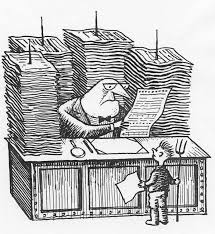记忆方法
将“bureaucracy”分解为“bureau”(办公室)加上“cracy”(统治、政府),想象一个充满繁琐文件的办公室,里面的人好像在掌握着一种无形的统治或官僚主义。这样的场景可以帮助记忆这个单词的意思。
以上内容由AI生成, 仅供参考和借鉴
中文词源
bureaucracy 官僚主义
bureau, 办公室。cracy, 统治。
英语词源
- bureaucracy (n.)
- 1818, from French bureaucratie, coined by French economist Jean Claude Marie Vincent de Gournay (1712-1759) on model of democratie, aristocratie, from bureau "office," literally "desk" (see bureau) + Greek suffix -kratia denoting "power of" (see -cracy).
That vast net-work of administrative tyranny ... that system of bureaucracy, which leaves no free agent in all France, except for the man at Paris who pulls the wires. [J.S. Mill, "Westminster Review" XXVIII, 1837]
bureaucrat, &c. The formation is so barbarous that all attempt at self-respect in pronunciation may perhaps as well be abandoned. [Fowler]
权威例句
- 1. People usually complain about having to deal with too much bureaucracy.
- 人们经常抱怨不得不应付太多的繁文缛节。
- 2. His firm must contend with the unwieldy Russian bureaucracy.
- 他的公司必须与俄罗斯庞大的官僚机构周旋。
- 3. They're making efforts to streamline their normally cumbersome bureaucracy.
- 他们正努力精简本来繁冗复杂的官僚体制。
- 4. They are faced with a mountain of bureaucracy.
- 他们面对一大堆繁文缛节。
- 5. Bureaucracy can entangle ventures for months.
- 官僚体制会使风险投资搁置好几个月。
